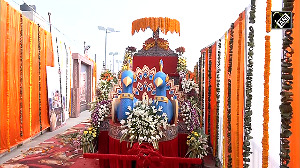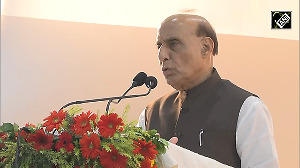India's fledgling Olympic campaign on Wednesday received a sensational boost with unheralded grappler Sushil Kumar clinching a bronze medal and boxer Vijender Kumar assuring himself of at least a bronze to give the country a record three medals for the first time ever.
After Abhinav Bindra's gold-winning feat during the first week of the sporting extravaganza, the 25-year-old Sushil Kumar shot into fame by winning a bronze medal in the wrestling arena while Vijender has put himself on course for a silver or gold medal on a historic day for Indian sports.
Sushil and Vijender's heroics not only provided the late sparks to an otherwise dismal campaign but has created a record of sorts as India had never returned with three medals from the Olympics.
India had won two Olympic medals in the 1952 Helsinki Games when the hockey team had won the gold medal and wrestler K D Jadhav had won a bronze medal, a record which had stood for 56 long years.
While Sushil and Vijender did the country proud, there was some heartbreak for the Indians with another medal contender pugilist Jitender Kumar losing his quarter-final bout despite a valiant effort in the ring.
After days of disappointments, it turned out to be a day to cherish for the Indians as Sushil found his way to the record books by becoming only the second wrestler in India's Olympic history to win a bronze medal in the men's 66 kg freestyle category.
Vijender then brought more cheers for the contingent by beating Ecuador's Carlos Gongora in the quarter finals of the 75 kg category with a 9-4 verdict.
Sushil's campaign seemed nearly over when he lost his first round battle against eventual silver medallist Andriy Stadnik but repechage provided him a ray of hope and the Indian proved simply irresistible as he beat three grapplers on the trot to win the bronze.
Down in the dumps after his opening round defeat, Sushil came up with an incredible show, beating Doug Schwab (USA), Albert Batyrov (Belarus) and finally the losing semifinalist Leonid Spiridonov (Kazakhstan) in the repechage rounds to earn his slice of history.
Incidentally, in the 2006 Doha Asian Games also, Sushil had beaten Leonid to win the bronze.
"Probably you may say that there was no expectation from the people back home and the media too. But me and my coach (Satpal) always knew I had a fair chance of winning a medal and I'm happy I could achieve that," a beaming Sushil said after winning the medal at the China Agricultural University.
"While it is good not to have that burden of expectation on your shoulder, I think we can give even more provided we get better facilities," said the wrestler.
Against Leonid, Sushil grabbed early initiative by scoring two technical points that proved decisive in the end.
Though the Kazakh grappler scored one in the second period and managed to thwart Sushil, the Indian proved his superiority again in the third period and eventually prevailed 3-2 to trigger frenzied celebration among the Indians present at the venue.
"I thought I'll do whatever it takes and the end result is the medal is mine. It's an unforgettable moment in my life and it seems I'm living in a dream," Sushil said.
Jitender faltered when it mattered the most and missed the Olympic medal by a whisker, losing his quarterfinal bout in the 51 kg event.
Jitender, who entered the ring with 10 stitches on his chin necessitated by a cut he had received in his previous match, threw everything at his experienced Russian rival Georgy Balakshin but the European champion maintained his superiority throughout four rounds to win the tie 15-11.
The seasoned Russian pugilist also had a better idea of when to engage and when to evade which gave him an edge throughout against Jitender.
After a rather sedate opening round which the Russian led 2-1, both started breathing fire and unleashed flurry of punches to share 10 points but Jitender simply lost the plot in the third round.
"I'm sorry I could not win the medal but I tried my best," rued Jitender, blood dripping from the cut he had received in the chin.
In table tennis, an erratic Achanta Sharath Kamal joined the fast-growing list of home-bound Indians after 32 minutes of futility in the second round of the men's event.
The lanky Indian tried every trick in the book before eventually bowing to his Chinese-born Austrian opponent Chen Weixing and crash out with a 1-4 defeat in just over half an hour.
It turned out to be a learning experience indeed for the Indian at the Peking University Gymnasium where Chen, armed with stinging whiplash forehand and vicious backhands, prevailed 11-5, 14-12, 11-2, 8-11, and 12-10.






